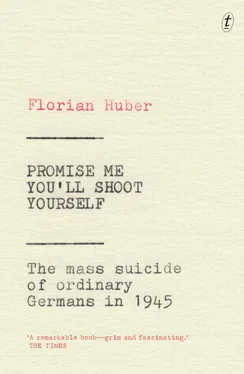These were the people whom the Reverend Jacobi lectured sternly on the subject of suicide, making it quite clear that under no circumstances did Christians have the option of killing themselves. No matter how bleak or miserable life on earth, particularly in times such as these, the prohibition against suicide was incontrovertible. To Kronika it seemed he was preaching directly to each and every person present:
We have no right to it, the preacher said. As Christians, we must be prepared to endure yet greater woes than those inflicted on us thus far. It was a profoundly earnest congregation that left this strange service.
Two things in particular struck the Danish journalist as odd. First of all, the people spilling wordlessly out of the parish hall had already been through quite a bit. They had been bombed out of their homes—or if not, they lived in fear of it. They had lost sons, husbands and other loved ones. Some had lost their livelihood. And now they were expected to endure even worse. But—and this was the second strange thing—Kronika saw no surprise in their grey, tight-lipped faces at the accusations of suicidal intent levelled at them by their vicar. Kronika decided to investigate. He waylaid the Reverend Jacobi at the door and asked him the reason for his sermon. Jacobi led him into his office and closed the door behind him. ‘There is risk of a suicide epidemic,’ the vicar said. ‘I have regular visits from parishioners who confide in me that they have procured ampoules of cyanide. They see no way out.’
Suicide epidemic —the Reverend Gerhard Jacobi was the first to use this term, evoking thoughts of an infectious disease lurking in large numbers of people, ready to break out at any time and spread like wildfire. Jacobi feared that such a disease was on the point of taking hold. Nazi propaganda had drummed it into the Germans that the Soviets brought hell on earth wherever they went. It was almost impossible to escape the horror stories, and, confronted with them day after day, many people saw no alternative but to equip themselves with poison.
• • •
The visit made a lasting impression on Jacob Kronika; in subsequent diary entries from a foundering Berlin, he would often return to that late-winter sermon and its prophecy of the rising wave of suicide across the German Reich. He saw it as a troubling echo of his own sense of foreboding a few days before, when he had come across a German colleague, a loyal Nazi journalist, on the verge of giving up. ‘I can’t carry on,’ the man had sighed. ‘Everything I believed in is turning out to be madness and crime.’ When Kronika bumped into him on Wilhelmplatz, in the government district, he was still wearing his swastika badge, still attending the press conferences at the Propaganda Ministry, like a good Nazi, still taking the mandatory tone in his writing, urging the people to carry on. And yet he could see that it was over. He was desperate, Kronika wrote.
But the tyranny forces him to keep going, the same as always, the same as since 1933… That is, in effect, the terrible tragedy of the German people: they can’t muster the strength or see their way to freeing themselves from the rule of evil.
This tragedy, a leitmotiv of Kronika’s diary, was also his own personal tragedy, at least on paper. As a member of the Danish minority in the German Reich, he held German citizenship as well as Danish and wrote not only for Danish and Swedish newspapers but also in the German press. He had initially welcomed the Nazi takeover, but soon distanced himself from ‘war’s rebellion against peace’.
You could tell just by looking at him. He was a civilian through and through. Although he’d been living in Berlin for thirteen years—he was in his late forties at the end of the war—he strolled the streets of the Nazi capital like a tourist, with his carefully coiffed salt-and-pepper hair, and a handkerchief in the pocket of his well-kept suit, like in peacetime. He had made it his mission to record Germany’s downfall to the end, so he spent his days wandering the city—pounding the pavements with their gritty covering of air-raid debris, or tramping through weed-choked parks. He passed scorched houses, bathtubs rusting on piles of rubble, twisted copper pipes and gaping rooms in which tiled stoves clung to the walls with a kind of vicious defiance.
He saw and analysed the symptoms of collapse and self-destruction, but above all he listened, and people seemed happy to open up to the friendly foreigner and tell him their stories. A favourite place for such conversations was the air-raid shelter, where Kronika sat out many hours with people from all walks of life. On 6 March 1945, the day of the Reverend Jacobi’s stern sermon, he noted in his diary:
Wilhelm II promised us glorious times, but they didn’t come. Hitler and Goebbels promise us large numbers of suicides and it’s exactly what we get! That’s what people were saying loud and clear in the air-raid shelter yesterday.
Kronika had noticed that suicide came up frequently now—in newspapers, on state radio, and even in the Nazi leadership’s rhetoric. ‘Goebbels has changed his tune: he is talking of suicide as a last resort.’ In a radio broadcast dripping with pathos, Goebbels had invoked the example of Frederick II, who had believed only in death or victory. Goebbels offered up the Prussian king as a heroic martyr because he had once, at a time of military crisis, toyed with the idea of taking poison. Rarely had the propaganda machine appealed so heavy-handedly to the self-sacrificing spirit of the German people.
At the end of his diary entry for 6 March, Jacob Kronika quotes the Reverend Jacobi: ‘The brunt of responsibility for this growing tendency to suicide falls on Dr Goebbels.’ But even the vicar failed to realise how serious the situation had become: in early March 1945, the suicide epidemic he feared was no longer a mere danger; it had already broken out and was spreading rapidly.
A Wave Rolling over the Reich
The thought of living on is unbearable, and it is equally unthinkable that I could now live a happy life with you, darling Inge, and our dear little girl, because the war—which seems to me as good as lost, what with the indestructible Bolsheviks on one side and the Americans joining on the other—will leave me unable to earn sufficient money, either now or in the future. The first and last cause of my despair is the hopelessness of victory.
This very thorough suicide note was found by the Berlin police on the body of a fifty-six-year-old teacher from Weissensee. It was addressed to his wife and dated 21 August 1943. The defeat of the German army at Stalingrad six months before had triggered a first spate of suicides throughout the Reich—suicides that had their root in the specific fear of Bolshevism and the more general fear of Germany’s bleak future.
This phenomenon was not restricted to civilians. After the debacle of Stalingrad, more than two thousand cases of suicide among Wehrmacht soldiers were reported in a few months—twice as many as in the first three years of the war. After the D-day landings in 1944, the Luftwaffe recorded another significant rise in suicides and suicide attempts. At this stage, however, incidents were still isolated, often planned long in advance, the decisions explained in suicide notes. Suicide in Germany still followed the classic pattern it had known in times of peace.
• • •
The military setbacks and blows to morale suffered at Stalingrad and on D-day, as well as the demoralising air raids on German cities, had cast a dark shadow, and not only over the prospect of victory. They also added a new—and quite unforeseen—dimension to the gruesome imagery used in anti-Allied propaganda. Portraying the enemy as barbarous murderers had been useful in rousing the German people to support the war effort, but there was nothing rousing in the thought that those same barbarous murderers were about to take Berlin and sweep triumphant across Germany. Rather than being bolstered by hate and pride, the German psyche was consumed by existential fear. The fear of invasion, of losing honour, homeland, family. The fear of losing life and its meaning.
Читать дальше












